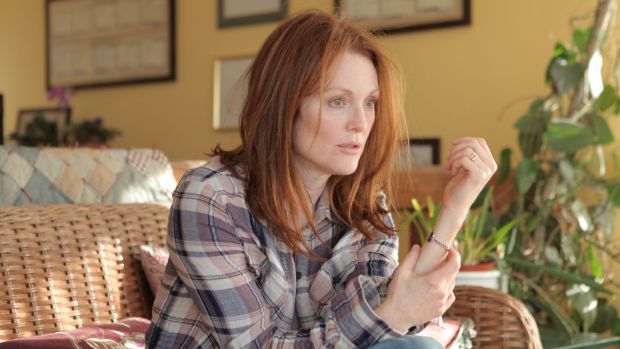
Sad reality: Julianne Moore stars in Still Alice, the story of one woman’s battle with young onset Alzheimer’s disease.
Last week, I treated a 48-year-old woman who has her own business and two teenagers. She has had to give up her work and can no longer drive. She cannot remember appointments and has difficulty using her mobile phone. She can’t remember many of the recent conversations she has had with her family and friends. After a number of investigations I diagnosed her with young onset Alzheimer’s disease.
The impact of dementia on our community has never been greater. Dementia is a medical condition, not a normal part of the ageing process, and clinical services for those living with the disease are sadly lacking.
Each week, more than 1800 new cases of dementia are diagnosed in Australia – that equates to about one person every six minutes.
The film Still Alice has been released nationally this week, and the story told is not dissimilar to the stories I often hear as a neurologist specialising in dementia.
Still Alice details one woman’s battle with young onset Alzheimer’s disease and the effect this has on her and her family. The movie is based on the novel by Lisa Genova, who has a PhD in neuroscience. She interviewed more than 27 patients, families and medical professionals at the Massachusetts Memory Clinic in Boston USA, about their experiences and made a composite character, Alice Howland – played by Julianne Moore.
Young onset dementia is an umbrella term used to describe a number of disorders affecting a person’s intellectual functioning in those aged under 65. Alzheimer’s disease is the most common cause, followed closely by frontotemporal dementia and then vascular dementia.
Alois Alzheimer first described Alzheimer’s disease in 1906. It is characterised by impaired memory, difficulty in learning, recalling recent events, problem solving and holding attention. Patients will often forget appointments, become disorientated and lost in familiar environments. I have seen many patients who have difficulty using a mobile phone and who cannot retain their own pin numbers.
There are more than 342,000 Australians with dementia. This number is expected to increase to 400,000 in less than a decade. Without a medical breakthrough, the number of people with dementia is expected to be almost 900,000 by 2050. Each week, more than 1800 new cases of dementia are diagnosed in Australia – that equates to about one person every six minutes. This concerning figure is expected to grow to 7400 new cases diagnosed each week by 2050,
This national problem is not about to dissipate and requires a change in the way we, as a society, address the problem. We currently do not have enough services to cope with this growing epidemic, so now is the time to start planning for the future.
Young onset dementia is particularly devastating as patients are still in their prime, still working and often still have school-aged children.
Added to this is the fact that around a fifth of young onset cases of dementia have a genetic basis. In Alzheimer’s disease and in frontotemporal dementia there are a number of causative genes. If a patient has one of these genes they have a 50 per cent chance of passing it on to their children. Surrounding this is immense guilt and grief.
The children who inherit this gene have often seen their own parent die of Alzheimer’s disease and know what is in store for them. The first family I remember meeting with familial AD, were two sisters aged in their 20s whose father had died of AD when they were just four. They were facing the prospect of whether to undergo testing for the gene.
As a neurologist working in dementia, I see Still Alice as an important movie because as it provides an insightful view of dementia from the perspective of the individual, something that to date has rarely been portrayed. There is a stigma associated with the diagnoses of dementia and a distinct lack of services available in Australia for those living with the disease and for those who will be diagnosed in the future.
For those of us working in the field, the film is a sobering reminder of why we entered into this specialty area and serves as powerful motivation to eventually find a cure. Yes, it is sad, and many will avoid seeing the film for this reason. But it is also a sad reality.
Dr Rebekah Ahmed is a consultant neurologist at Neuroscience Research Australia and Royal Prince Alfred Hospital, Sydney.
